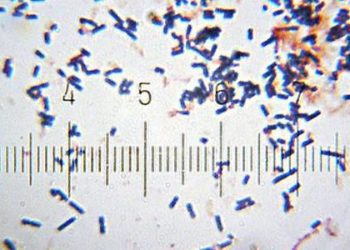Fidaxomicin vs. vancomycin in C. difficile infection [Classics Series]
1. Fidaxomicin is non-inferior to vancomycin in achieving clinical cure of C. difficile infection
2. Fidaxomicin therapy significantly reduces the rate of recurrence and significantly increases the rate of global cure of C. difficile infection when compared with vancomycin therapy
Original Date of Publication: February 3, 2011
Study Rundown: Clostridium difficile infection is a common complication affecting patients being treated with antibiotics. The incidence of C. difficile infection is increasing rapidly and mortality from C. difficile is steadily rising. Infection manifests in a range of symptoms, from diarrhea to inflammation of the entire colon, potentially necessitating surgical management. Recent data have been concerning, as numerous studies have shown poorer response to treatments and higher rates of recurrence compared with previous decades. Currently, the commonly used antibiotics used in treating C. difficile are metronidazole and vancomycin. Fidaxomicin is a newer macrocyclic antibiotic that was designed to selectively eradicate C. difficile. It is more active than vancomycin in vitro and is minimally absorbed into the bloodstream, thereby remaining in feces in high concentrations. A phase 3 non-inferiority trial was performed to compare the effects of fidaxomicin and vancomycin in treating C. difficile infection.
In summary, fidaxomicin was shown to be non-inferior to vancomycin in achieving clinical cure of C. difficile infection. Rates of recurrence were significantly lower in the fidaxomicin group when compared with the vancomycin group (15.4% vs. 25.3%, p=0.005 for modified intention-to-treat; 13.3% vs. 24.0%, p=0.004 for per-protocol). The rates of global cure (i.e., cure without recurrence) were significantly higher in the fidaxomicin group (74.6% vs. 64.1%, p=0.006 for modified intention-to-treat; 77.7% vs. 67.1%, p=0.006 for per-protocol). In 2011, fidaxomicin received full U.S. Food and Drug Administration approval for treating C. difficile infection. The cost of a 10-day course of fidaxomicin has been estimated to cost around $2,200, which is many times more expensive than a course of oral vancomycin. Thus, the cost of fidaxomicin has been a major barrier to wider use.
Click to read the study in NEJM
In-Depth [randomized, controlled study]: Originally published in 2011 in NEJM, this phase 3 non-inferiority trial compared fidaxomicin with vancomycin in treating C. difficile infection. A total of 629 patients were recruited from 67 sites across Canada and the U.S. and randomized to receive a 10-day course of fidaxomicin 200 mg orally every 12 hours or vancomycin 125 mg orally every 6 hours. Patients were eligible if they were 16 years of age or older, had a diagnosis of C. difficile infection (i.e., change in bowel habits, ≥3 unformed bowel movements in 24 hours prior to randomization), and a stool specimen positive for C. difficile toxin A, B, or both in the 48 hours prior to randomization. Patients were excluded if they had life-threatening or fulminant C. difficile infection, toxic megacolon, a history of inflammatory bowel disease (i.e., ulcerative colitis, Crohn’s), or more than one occurrence of C. difficile infection in the 3 months before the study. The primary endpoint was the rate of clinical cure (i.e., resolution of diarrhea with no need for antimicrobials on the second day after treatment finished). The secondary endpoints were recurrence of C. difficile infection in the 4-week period after finishing therapy and global cure rates (i.e., resolution of diarrhea without recurrence).
In the modified intention-to-treat, 88.2% of patients treated with fidaxomicin and 85.8% of those treated with vancomycin met criteria for clinical cure. In the per-protocol analysis, the proportions experiencing clinical cure were 92.1% and 89.8% in the fidaxomicin and vancomycin groups, respectively. In both instances, criteria for non-inferiority were met. The rates of recurrence were significantly lower in the fidaxomicin group compared to the vancomycin group in both the modified intention-to-treat (15.4% vs. 25.3%, p=0.005) and per-protocol analyses (13.3% vs. 24.0%, p=0.004). The rates of global cure were also significantly higher in patients treated with fidaxomicin as compared with vancomycin (74.6% vs. 64.1%, p=0.006 for modified intention-to-treat; 77.7% vs. 67.1%, p=0.006 for per-protocol). There were no significant differences between the two groups in the rates of adverse events.
Image: PD
© 2012-2014 2minutemedicine.com. All rights reserved. No works may be reproduced without expressed written consent from 2minutemedicine.com. Disclaimer: We present factual information directly from peer reviewed medical journals. No post should be construed as medical advice and is not intended as such by the authors, editors, staff or by 2minutemedicine.com. PLEASE SEE A HEALTHCARE PROVIDER IN YOUR AREA IF YOU SEEK MEDICAL ADVICE OF ANY SORT.







